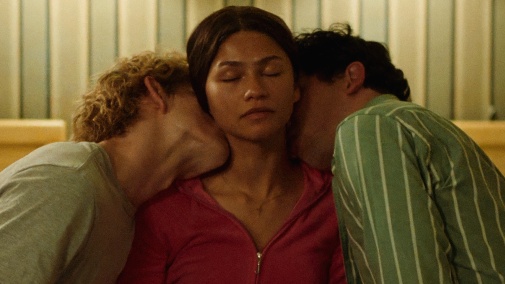
American mainstream cinema has rarely felt as sexless as it does today. Even in the period between the 1934 implementation of the Hays Code and its demise, screens felt roused with desire. In some ways, the prohibition of overt sexuality supercharged movies with erotic potential, like a pot of boiling water that heats up faster once you put a lid on it. But nowadays, such qualities feel like artifacts of a bygone era. That's not to say movies suddenly lack objects of desire. Instead, as RS Benedict put it in his essay on superhero films, "everyone is beautiful and no one is horny." But here comes Luca Guadagnino to the rescue, that lustful Italian whose films beckon a return to hedonistic cinema even when produced within Hollywood. Challengers is a prime example of that…
As you might have heard by now, Challengers was written by Justin Kuritzkes, husband to Celine Song, who gave us her own take on a love triangle last year. Because of its more declared autobiographical nature, it's easy to project the specificities of Past Lives into its maker's own marriage, influencing how we might interpret Kuritzkes' output. And make no mistake, it's fascinating to consider the thematic similarities between the two pictures and how their tales of entangled loves can sometimes feel in conversation with each other. However, trying to psychoanalyze artists isn't something that interests me terribly.
So, let's step over that whole thing and consider Challengers as film rather than one couple's private bonds made public.
Long story short, we're before a melodrama disguised as a sports movie, the story of one Tashi Duncan and the two men in her orbit. They are Art Donaldson and Patrick Zweig, former doubles partners whom we meet on the tennis court during the final of a Challenger event in New Rochelle. This is not the start of their tale, however, but an in media res device with which Guadagnino and Kuritzkes introduce the viewer to their project's overcomplicated chronology. From the match, the action jumps in fits and starts, whether to the weeks that preceded it or the genesis of it all, over a decade prior when the three protagonists first met.
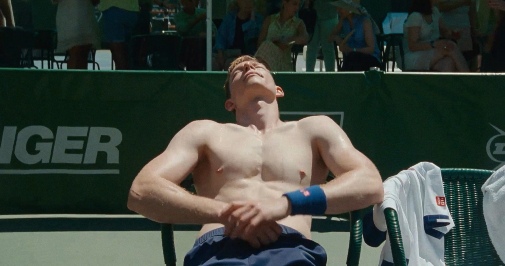
It's 2006, and the two boys are close as close can be, living up to the hype of a recent victory when they cross paths with Tashi at a Junior Open afterparty. Besotted by the prodigy, the friends try to strike up a conversation, ending the night with Tashi in their hotel room. But rather than give in to their sexual wants, she leaves before things get too steamy, making them an indecent and irresistible proposal. Whoever wins their solo match the next day will get to have her phone number. Patrick is the lucky bastard, but the audience already knows by this point that it's Art who'll marry Tashi in the future and forge a millionaire brand as a star player and his coach.
Part of the fun of Challengers is figuring out the web of interconnected liaisons between the three characters, how they got to the tension we saw in the opener, and what it all means for them as the New Rochelle final draws to a close. See what I mean about it being more melodrama than sports movie? Sure, Kuritzkes script tries to sell his audience on tennis as a relationship. But its real interest lies in what happens when you regard your personal life as a competition, where winning is the goal rather than true happiness or whatever contentment one might find along the way. At the very least, that should be what's going on inside the picture's biggest cipher – Tashi herself.
Though her actions put the entire narrative in motion, the wunderkind turned coach is something of a thinly-written mystery the film purports to understand without ever pinning down. She's a calculating seductress and a volatile element, someone who wants to be adored but maybe not loved, who seeks victory above all else even when the terms of such triumph aren't always clear. As written, the role requires a fair bit of self-knowing cynicism to go with everything else, but I'm not sure either Zendaya or Guadagnino get that. Indeed, while she's being praised by many critics, I can't quite agree that this leading lady is up to the challenge the movie serves her.
She doesn't necessarily fail, and one must acknowledge Tashi is, by far, the text's most demanding, least transparent role. One gets the idea she's always protecting herself, maybe even from her own scrutiny, keeping the audience at a significant distance while demanding their attention. Moreover, as the central figure in the melodrama, Tashi's emotions must be readable beneath the enigma, trickles of water escaping through the cracks of an imperfect dam. Only Zendaya can't quite tap into that register, often stuck in a belabored projection, some too demonstrative and not entirely credible show of internal judgment laid bare.
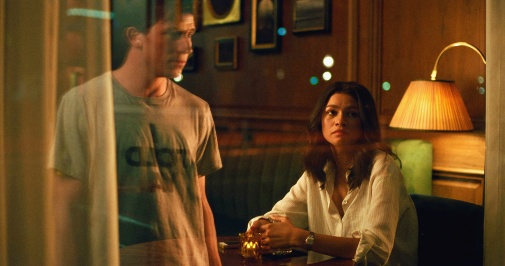
A more mercurial presence might have solved this conundrum, making the characterization about a disciplined yet failed concealment. Instead, we get a written mystery acted like an open book, which could be interesting in another context but is rather fraught within Challengers. To make matters better or worse, depending on your perspective, Zendaya is joined by two actors at the top of their game, able to tackle their respective roles with all the precision and stamina lacking elsewhere. As Patrick, Josh O'Connor gets the easiest part, wearing dirtbag sleaze like a second skin and letting his audience gawk into the player's personal chaos, open-wound style.
Mike Faist, on the other hand, complicates the character of Art, conceiving a tridimensional portrait that, at times, resembles the perfect midpoint between Patrick's naked need and Tashi's calculated game. He's the movie's secret weapon, a beauty that can be rat-faced insidious one moment and angelic the next, a mastermind and a fool wrapped into one. The two men are so excellent they energize Zendaya's Tashi, pulling the best work from the actress. Consider a marital argument shot like a zig-zagging volley where the contenders both end with their wheels spinning. Or two late-night seductions, sutured together across time, equal parts desire and despair. Still, the men's homoerotic chemistry trumps either of their straight connections.
In summation, as character drama, Challengers is a mesmerizing mess. But that's not all the picture has to offer. Indeed, one could go so far as saying all that is a mere pretext for the project's true purpose – to be a prickle of desire so potent it's like you got an IV shot of the world's strongest stimulant. Because, no matter how much Guadagnino might vacillate in his conception of Tashi and Zendaya's portrayal, he's mad with inspiration when it comes to cinematic form. Just the way he films tennis should be enough to justify the price of entry, a swirl of infinite possibility where the physical limitations of cinema are shown the middle finger.
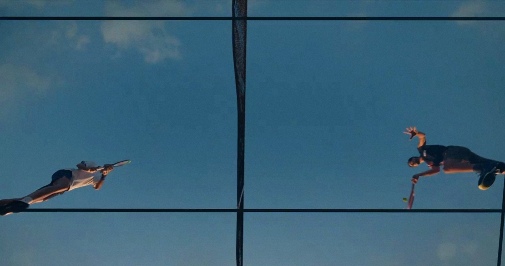
The best way I can find to describe it is a comparison to anime. Though I was raised in a culture obsessed with football (or what you Americans would call soccer), I've never shared the passion that rumbles within countless family members and friends. However, as a kid, there was one version of it I could stomach and even love. It was the bombastic facsimile of the sport seen in animes like Captain Tsubasa, where every motion was a potential set piece, each goal an event of world-shaking euphoria or a cataclysm. In animation, the field could stretch and compress with each shot, time could stand still, the matter of exerting bodies turned magical.
Guadagnino does that to tennis in Challengers, invigorating the script's structure by taking every jump back to the New Rochelle final as an opportunity to depict the sport in exciting new ways. At one point, the camera is beneath the ground, looking up at the two players against the blue sky. Another moment might find the screen caught up in their nervous POV, while a later scene switches up the human perspective for the ball's, careening through the air in dizzying lunacy that feels like it should be impossible to visualize. And yet, Guadagnino does the impossible over and over again, even finding the eroticism in ritualized sport without needing to fuck anyone with a racket – though that wouldn't be an unwelcome or improbable turn of events.
In shots of sweat dripping from Faist's brow into the lens and O'Connor's rippling calf, the director gives added weight to the text's notions of tennis as a relationship. Then again, that term is somewhat erroneous. Kuritzkes might see it as an emotional affair, but Guadagnino takes it to carnal extremes, whether in the court or not. The privacy of a hotel room and a suggestive churro are just other takes on sportive combat cum erotic match, with the director's queer gaze becoming a fourth lover in the Challengers dynamic. It laps up the perspiration and longing of its fellow points in what initially looks like a triangle before revealing itself a love square. And as another mistress, film form sometimes gets off by itself.
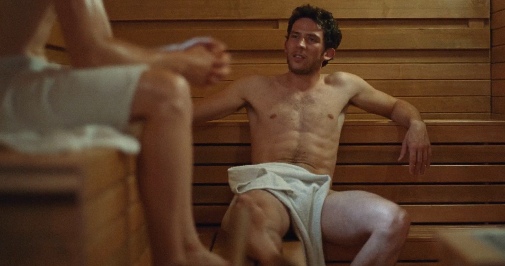
If the characters can't find completion on screen, the camera will be responsible for its own orgasm, thank you very much. The way Guadagnino and master cinematographer Sayombhu Mukdeeprom shoot bodies is rich enough to fill a book, varied and multifaceted, intent on sparking wantonness in the audience. It twists it into revulsion, too, mayhap a menace or a lustful weapon for sauna-set confessions. And then there's the score, oft manifest as a house beat that recalls nightclubs more than the tennis court, throbbing with a pleasant buzz when it's not racketing up the tension. The cutting's wild as well, disruptive and desperate to be noticed, an overeager kinkster living their best life at some massive orgy.
A triumph of execution over narrative, Challengers is another feather in Luca Guadagnino's cap. When it comes to cinema of desire, nobody is doing it like him, especially when you limit your sample to the Hollywood machine.